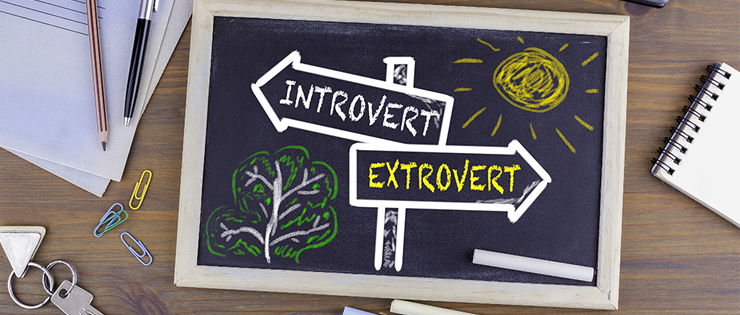
What’s the difference between Introverts and Extroverts? (and what does it mean for you depending on which one you are?)
I’m sure you’ve all heard of the personality descriptors, “introverts” and “extroverts”. And I’m sure you all have some thoughts on which one you are. But there are many myths and misconceptions about these psychological terms; and an incorrect “label” might be more unhelpful than you realise.
Let’s go back to the beginning. The most widely used system for assessing and describing an individual’s personality is what’s most often referred to as the “5 factor model”. These 5 factors are believed to be the 5 core traits that make us who we are. In no particular order, they are conscientiousness, agreeableness, neuroticism, openness (to experience) and introversion/extroversion.
As you might be able to determine from the way the last of these traits is written, introversion and extroversion are considered to be the extreme ends of a continuum; something that is also understood to apply to the other four even though only one end of their dimensions is typically referred to.
In short, therefore, introversion/extroversion is a key dimension within all of our personalities. As with most aspects of personality, most of us sit somewhere in the middle, meaning we possess aspects of introversion as well as aspects of extroversion. But some people tend more towards one extreme or the other.
The two extremes can be defined like this:
- Introverts are typically perceived as being more reserved and reflective; being more interested in their own, internal worlds. They tend to find social interaction draining, and time spent alone more energising.
- Extroverts, on the other hand, are typically seen as being more gregarious, outgoing and enthusiastic; accordingly, they’re much more interested in the external world around them. In contrast to introverts, extroverts are energised by social interaction and spending time with others.
It’s important to note that introversion is not the same as shyness or social anxiety. The former is essentially a preference; whereas the latter is associated with avoidance due to emotional distress.
As hinted at earlier, most of us are part introvert and extrovert; that is, this is not a completely dichotomous construct but rather, a dimension upon which we might flow between both ends depending on a range of factors (including our mood, energy levels, the surrounding situation and even who we’re with).
But if we do tend more toward one extreme than the other, what does this actually mean?
What it doesn’t mean is that extroverts are always happier and more successful! Although some studies have pointed to these conclusions, other researchers and writers have provided considerable evidence to support the notion that introverts are just as able to enjoy a good life, in their own way (for a fascinating take on this, see Susan Cain’s Quiet Revolution – HERE).
And the key is in a few words in the previous paragraph; no matter where you sit on the introversion/extroversion continuum, you need to find a way to live your life … your own way! If you tend toward introversion, this will mean ensuring adequate time on your own, taking time to observe and think about new situations, preparing well in advance when and where ever possible, and fostering a small group of key confidantes. For the extroverts reading this, it will be more important for you to acknowledge that your enthusiasm and independence are strengths, to be managed and utilised; and that fulfillment will often come from finding ways to allow your light to shine as brightly and as publicly as possible.
At the risk of confusing you, it’s worth noting that there’s another description that applies to those who vacillate between introversion and extroversion. These people are called “ambiverts”! Ambiverts adapt. At a party, an ambivert easily engages in conversation, moving from person to person throughout the night, much like the extroverts at the gathering. But that same ambivert also enjoys dinner and a movie alone. Ambiverts act like extroverts in social situations and introverts when alone.